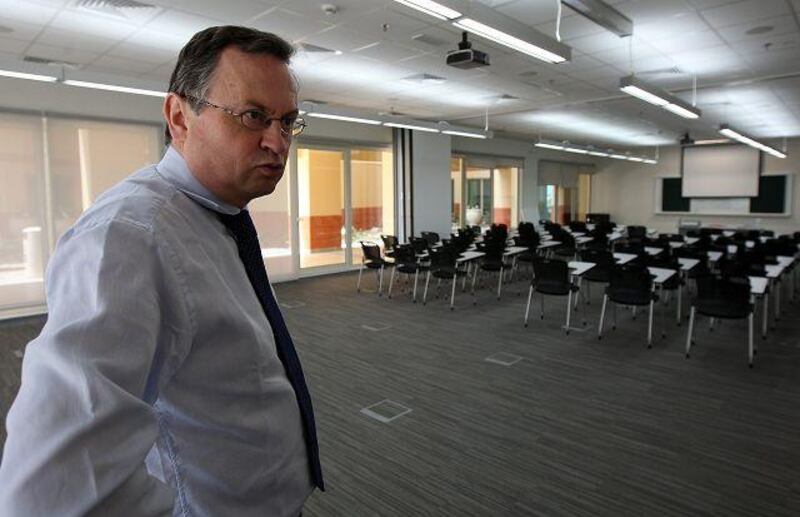The Dubai branch of a US university that hoped to lure 100 students from other institutions by offering half-price tuition fees found only 20 people who met its entry standards. Michigan State University admitted it had hoped to be able to take more students for the programme after receiving 200 applications. It is the latest of a series of cases where western universities have said finding well-qualified students in the UAE has proved difficult.
Brendan Mullan, the executive director of Michigan State's campus at Dubai International Academic City, said he expected more students to join through the transfer programme. "It's a strong endorsement of our refusal to compromise on academic quality standards," he said. "We're not going to dilute or relegate that. "We must gauge and evaluate our applications on the basis of our standard admission criteria."
Ali Bhayani, the chief operating officer at Michigan State University in Dubai, said "the vast majority" of applicants did not meet the university's entry standards. "It was surprising and a concern to us to see that some of these students were already enrolled at public and private universities, given their current academic performance and capabilities," he said. The Dubai branch submitted 40 applications to its headquarters at East Lansing, Michigan, of which 20 were approved, with rejection based on academic criteria.
Dr Mullan admitted that, with only 106 undergraduates more than a year after opening, the university was "not where we thought we would be" in terms of student numbers. "We have differentiated ourselves by our strict adherence to quality. It's a lot easier said than it is to live with," he said. The transfer students were in their first or second year of studies at other universities within the UAE, although the offer was open to people studying outside the country.
They are joining courses at Michigan State in subjects such as business, construction management, and computer and electrical engineering. Each transfers credits from their former university. Several other branch campuses of western universities have struggled to recruit students after opening in the Emirates. George Mason University, an American institution, closed its Ras al Khaimah branch last year after failing to reach an agreement with the emirate's Government over funding following several years of poor enrolment. It had just 40 undergraduates when it launched degree courses in 2006.
The University of Waterloo, based in Canada, enrolled 25 undergraduates for its first classes last year, little more than a fifth the number predicted. Others have grown more rapidly. Heriot-Watt University, the DIAC branch of a university based in Edinburgh, Scotland, took on about 800 new students last autumn, bringing total enrolment to 1,500. Its tuition fees, at between Dh39,500 and Dh45,000 per year, are lower than Michigan State's full annual fees of about Dh58,000.
Brian Smart, Heriot-Watt's executive director and dean of campus, said he had "no issue at all" with attracting good students and was "delighted" with those enrolled. He insisted the university here "admits to the same standard" as its home campus, adding that students here perform as well as their counterparts in Scotland. "We don't do anything we wouldn't do in Edinburgh," he said. According to Clifton Chadwick, a senior lecturer in international education management at the British University in Dubai, it might be difficult for universities in the UAE to attract top-class students because high-fliers are more likely to want to travel to the home campus.
"If people are that good, they're probably going overseas," he said. However, he said his university's recently launched doctoral programme attracted "at least 25 excellent" applicants, indicating there "are good people out there", although each of those accepted had a master's degree from an overseas university. Despite its modest enrolment in Dubai, Michigan State University is committed to staying in the emirate, said its provost, Kim Wilcox. He said low student numbers early on were not unusual.
"We're still in our infancy," he said. "I have every confidence that, like every other nation that has built university systems that succeed over time, that's what we'll be doing: succeeding over time." He said the university relied upon "multiple revenue streams" so even with modest student numbers and limited income from tuition fees, there were other sources of revenue, such as research grants.
Although as a free-zone-based institution it is not obliged to, Michigan State is applying for a licence from the Ministry of Higher Education and Scientific Research and for accreditation for its courses from the ministry's Commission for Academic Accreditation. "This will increase our viability and value to students in terms of graduating from a university with federal accreditation," Dr Mullan said.
dbardsley@thenational.ae







